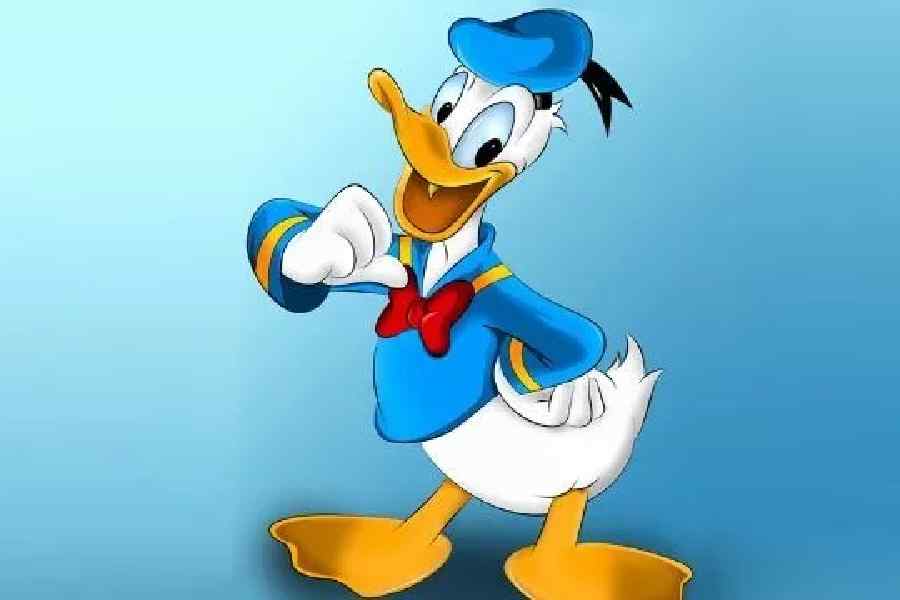Donald Duck’s first appearance on screen was the animated short titled The Wise Little Hen. He was intended as a one-off supporting character, but his immediate popularity meant Disney used him in subsequent comic stories and animated shorts.
Within a few years of his debut appearance in 1934, Donald Duck had already achieved a celebrity status comparable to Shirley Temple or Greta Garbo. His popularity is made clear in Disney’s 1939 animated short The Autograph Hound, whereby the Hollywood A-List of the time drop their studio filming commitments to seek Donald’s autograph.
By 1940, Walt Disney himself referred to Donald Duck as “the Gable of our stable” – pairing Donald’s popularity with the Hollywood superstar Clark Gable, the biggest name at MGM Studios at the time. Donald’s icon status was cemented in the 1940s the world over, from comic books in Europe and South America, to starring in US government domestic propaganda during the second world war.
Donald starred in cartoons designed to encourage Americans to rally behind the war effort. These short animations range from encouraging people to invest in American government bonds, to ridiculing Hitler as a deranged despot. The latter short – Der Fuehrer’s Face – won Donald his first Oscar in 1943, though it has since been widely criticised for its caricatured imagery of Japanese people.
Donald is arguably as popular now as he was in his mid-20th century peak. Media researcher Chris Rojek has even used Donald as an example in his categorisation of celebrities. The duck represents the archetypal “celeactor”, a “fictional character who is an institutionalised feature of popular culture”.
Unlike many Disney characters, Donald’s stories take place in the present day and his stories are contemporary to the audience enjoying them. This is clear in his relationships with female characters.
In Donald’s early days, female characters were often limited to representing beauty, domesticity and subservience to the patriarchy – reflecting the experiences of women the world over. For example, Daisy Duck was originally almost never shown as having her own job or career, in sharp contrast to Donald, who is shown in many jobs including private detective, postal worker and salesperson.
In more recent years, though, female characters have developed to reflect the modern world. This includes the animated debut of characters such as Donald’s sister Della Duck.
Della is a skilled pilot, often found in the middle of action scenes and essential to the plots of the comic-book series Ducktales (2018), as well as the television show of the same name. Della Duck, Daisy Duck and other female characters have agency in these stories – they are main characters and not merely there to support the male superstar.
Arguably, Donald Duck is a more relatable character than aliens from a galaxy far away, or teenage royals from a place of “once upon a time”. Donald and his friends meet the same daily challenges and enjoyment we do; traffic jams, job (dis)satisfaction, seaside holidays, festive family gatherings and so on. It is not difficult for his audiences to empathise, identify and understand the situations Donald finds himself in.
Relatable experiences have been an important narrative device for Donald Duck over the past 90 years. Donald enjoyed the technological developments of radio and television in the animated shorts he starred in during the 1930s, 1940s and 1950s. And in his most recent animated appearances in Ducktales, characters are seen using social media platform QuackChat – an obvious parody of Snapchat.
Donald Duck is eternally popular because he is the “everyman”. People the world over still find much to relate to and laugh at in his temper tantrums at life’s travails. He provides a way to project our own frustrations in a comparable way to more adult cartoon stars, such as Homer Simpson of The Simpsons or Peter Griffin of Family Guy.
As long as Donald keeps pace with society, and continues to reflect the ever-changing world we live in, this duck is unlikely to fly away anytime soon.
The Conversation
Except for the headline, this story has not been edited by The Telegraph Online staff and has been published from a syndicated feed.










